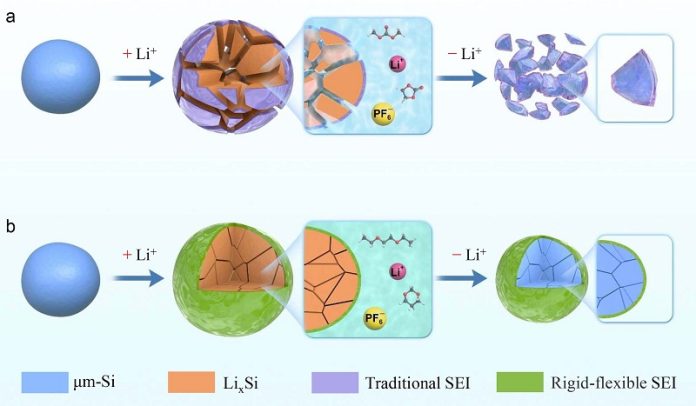
Researchers from the Qingdao Institute of Bioenergy and Bioprocess Technology (QIBEBT) of the Chinese Academy of Sciences have developed an innovative way to make lithium-ion batteries more powerful and sustainable.
They have created low-cost, micro-sized silicon anodes from recycled photovoltaic (solar panel) waste, using a new type of electrolyte.
This exciting work was published in the journal Nature Sustainability.
Silicon anodes are known to greatly increase the energy density of lithium-ion batteries compared to traditional graphite anodes.
However, they have a significant drawback: during charge and discharge cycles, silicon anodes expand and contract, causing them to crack and degrade battery performance.
The researchers, led by Prof. Cui Guanglei, tackled this problem by using micro-sized silicon particles derived from discarded solar panels.
The team paired these micro-sized silicon (μm-Si) particles with a specially designed ether-based electrolyte. This combination showed impressive results. The μm-Si anodes exhibited excellent electrochemical stability, maintaining an average efficiency of 99.94% and retaining 83.13% of their initial capacity even after 200 cycles of charging and discharging.
“This work not only suggests a more sustainable source for silicon particles but also addresses the major challenges facing micro-sized silicon anode materials,” said Dr. Liu Tao, the first author of the study.
The success of these anodes is due to their unique solid-electrolyte interphase (SEI) chemistry, achieved with a new electrolyte formulation. This formulation includes 3 M LiPF6 dissolved in a mixture of 1,3-dioxane and 1,2-diethoxyethane. It creates a dual-layer SEI that is flexible yet strong, holding together the fractured silicon particles and improving ionic conduction while minimizing unwanted reactions.
The new anode and electrolyte combination was tested in NCM811||μm-Si pouch cells, which survived 80 cycles and delivered an impressive energy density of 340.7 Wh/kg under harsh conditions. This is a significant improvement over conventional lithium-ion batteries, which are nearing their energy density limits.
Dr. Dong Tiantian, another co-first author of the study, highlighted the environmental benefits: “Using silicon from discarded solar panels reduces both the economic and environmental impact of photovoltaic waste. Turning waste into valuable battery components lowers the cost of lithium-ion batteries and makes them more accessible.”
Prof. Cui is optimistic about the future: “By using recycled materials and advanced chemical engineering, we have shown that high-performance and environmentally sustainable lithium-ion batteries are not only possible but also within reach. This research could lead to the development of next-generation batteries capable of powering everything from electric vehicles to large-scale energy storage systems.”
This breakthrough not only improves battery performance but also offers a sustainable solution to managing solar panel waste, marking a significant step towards greener and more efficient energy storage technologies.



